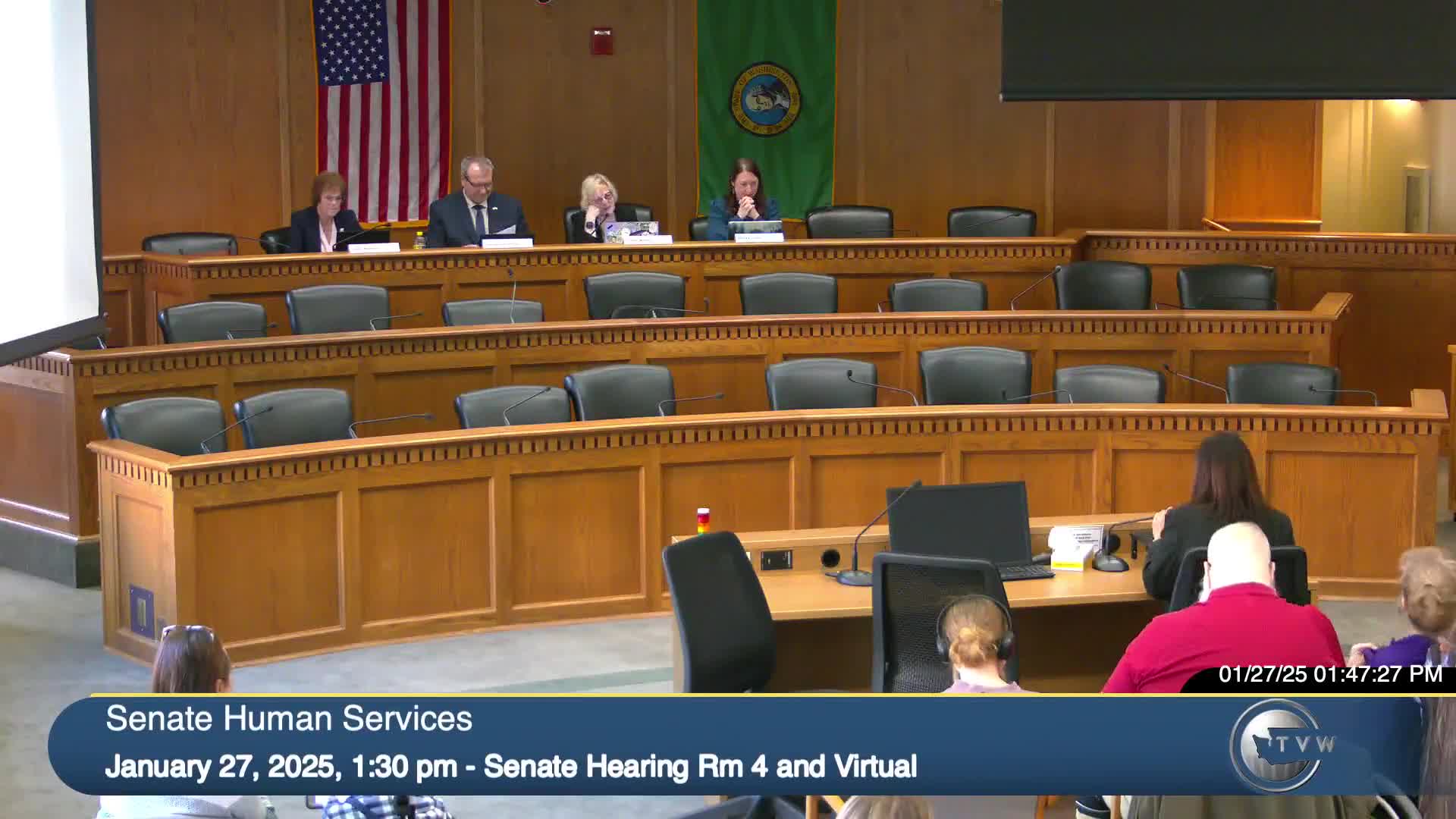Senate committee hears hours-long testimony on bill to allow parents to be paid caregivers for minor children with developmental disabilities
Get AI-powered insights, summaries, and transcripts
Subscribe
Summary
Senate Bill 5211 would require the Developmental Disabilities Administration to seek Medicaid waiver changes to allow parents of minor children with developmental disabilities to be paid for defined "extraordinary care," proponents told the Senate Human Services Committee during a daylong hearing with dozens of family and clinician testimonies.
Senate Bill 5211 would direct the Developmental Disabilities Administration to seek Centers for Medicare & Medicaid Services waiver amendments so parents may be paid for providing certain "extraordinary care" to minor children, committee staff told the Senate Human Services Committee. Allison Mendiola, committee staff, briefed the bill to the panel and outlined the proposed substitute and fiscal estimates.
The bill matters to families, advocates and clinicians because Washington currently bars payment to parents who provide personal care to minor children on DDA waivers; proponents say the restriction leaves promised hours unused amid a persistent workforce shortage. "This is not a bill to pay parents to be parents. This is a bill to employ us for the work we can't hire out because no one else is willing," said Kimmy Nova, a parent from East Wenatchee who testified in favor of the bill.
Under the substitute described in the staff briefing, DDA would, no later than Jan. 1, 2026 or as necessary based on waiver approval, submit waiver requests to allow parental caregivers to be employed as individual providers for hours defined as extraordinary care. The bill would limit parental payment to extraordinary-care hours (as defined in the substitute) while other assessed personal care hours would remain on the community-first-choice option. The substitute includes an implementation timeline that broadens the definition of extraordinary care starting July 1, 2031.
Proponents filled the committee room. Parents and caregivers described care tasks that include ventilator management, feeding-tube care, frequent hospital transports, 24-hour monitoring and other skilled tasks. "He was born at 25 weeks ... between my husband and I we've had 20 jobs in the last 15 years not for lack of qualifications but because businesses can't or won't employ us because of our commitment to Jaden's care," said Jessica Morrow of Lake Stevens, whose testimony noted the family was considering out-of-state institutional placement because they could not hire in-home caregivers.
Medical and provider representatives also spoke. Dr. Stephanie Rager, pediatric palliative care physician, described home care that can be equivalent to skilled nursing and said families face an unfair choice between working and keeping medically fragile children safe at home. Union and provider representatives said 30 states employed parents during COVID-19 and 27 have made parental employment permanent. Testimony from ASHA House Northwest and family-support organizations argued the change would increase utilization of already-authorized hours and produce state savings by avoiding costly institutional placements.
The committee heard fiscal estimates released shortly before the hearing: the fiscal note included a general fund-state cost of about $7.07 million for the 2025–27 biennium and $23.456 million for the 2027–29 biennium; staff said the estimate assumes roughly 1,017 clients and that about 160 of those are not currently on waiver services and would require enrollment to access the extraordinary-care payment. Proponents said wages paid to parent providers would be the same as those for other individual providers and that federal matching dollars would apply.
Committee members listened but did not take a committee vote on the bill at this hearing. The chair closed public testimony after an extended panel of family caregivers, clinicians and advocacy groups and said the committee would continue considering the issue.
The hearing combined first-hand family accounts—parents who described years without stable caregivers and the risk of institutionalization—with clinical and policy testimony about workforce shortages, program budgeting and federal waiver rules. Several parents asked for the committee's support to expand the caregiver workforce so authorized hours are actually delivered to children.
The committee did not adopt the bill at the hearing; staff and senators signaled continued work on fiscal and implementation details.
Ending: The committee closed testimony on SB 5211 and moved on to other agenda items; no final committee action on SB 5211 is recorded in the transcript.
